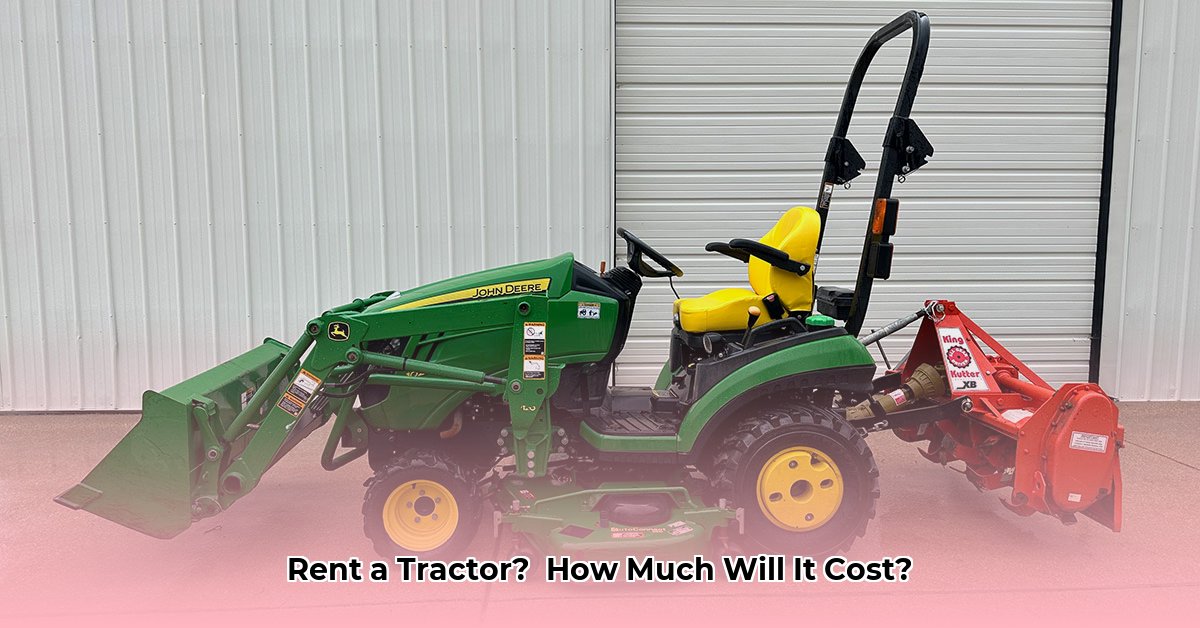
So, you need a tractor, but buying one feels like a massive financial commitment? Renting is a smart alternative! This guide breaks down tractor rental costs and helps you find the best deal, whether you're a seasoned farmer or a newcomer. For those considering a longer-term commitment, check out these tractor lease options.
Decoding Tractor Rental Costs: Factors Influencing Price
Several factors influence tractor rental costs. It's more complex than just horsepower!
Tractor Size and Horsepower: Larger, more powerful tractors command higher rental fees. A small tractor for light yard work will cost significantly less than a heavy-duty model for large-scale farming.
Tractor Age and Condition: Newer tractors with advanced features typically have higher rental rates than older models. This is similar to the difference between new and used cars.
Rental Duration: Daily rates are generally higher than weekly or monthly rates. Rental companies frequently offer discounts for longer rental periods.
Geographic Location: Rental prices vary significantly by region. Areas with high demand or limited supply often have higher rates. Urban vs. rural areas will also likely exhibit differences in price.
Attachments and Add-ons: Additional equipment like tillers, loaders, or other attachments will increase the overall rental cost. Determine your exact needs before starting your search.
Hunting for the Best Tractor Rental Deals: A Step-by-Step Guide
Finding the best deal involves some research, but it's worth the effort. Don't settle for the first quote you find!
Assess Your Needs: Define your project's requirements. How much horsepower do you really need for efficient completion? Overestimating requirements increases unnecessary costs.
Compare Rental Options: Utilize online marketplaces for comparison shopping; they're excellent for initial research. However, don't overlook local businesses; they may offer competitive rates and personalized service.
Compare Total Costs: Go beyond the daily rate. Consider insurance (essential!), hidden fees, and the rental agreement’s terms. A thorough comparison is key.
Verify Availability: Confirm the tractor's availability for your desired dates. Booking in advance, particularly during peak seasons, is crucial to avoiding disappointment.
Pre-Rental Inspection: Before signing, thoroughly inspect the tractor for pre-existing damage. Document everything with photos to prevent future disputes.
Review the Contract: Carefully read the rental agreement. Understand the terms and conditions, including insurance, payment schedules, and late fees. Ask questions if anything is unclear.
The Pros and Cons of Tractor Rental: A Balanced Perspective
Renting a tractor offers distinct advantages and disadvantages. Consider both sides carefully:
| Feature | Pros | Cons |
|---|---|---|
| Cost | Significantly lower upfront investment compared to purchasing. | Rental costs can accumulate, potentially exceeding the purchase price for long-term use. |
| Flexibility | Access to various tractor sizes and models as needed. | Limited control over maintenance; reliance on the rental company's schedule. |
| Maintenance | No responsibility for upkeep, repairs, or storage | Potential rental delays due to necessary repairs during your rental period. |
| Insurance | Often included or available as an add-on. | Added insurance costs may inflate overall expenses. |
Long-Term Considerations: Leases and Cost Comparisons
For recurring needs, a long-term lease may be more cost-effective than repeated short-term rentals. Always conduct a thorough financial comparison of renting versus buying. Factor in depreciation, maintenance, storage, and insurance for ownership.
How to Find the Best Agricultural Tractor Rental Near You With Specific Attachments
Key Takeaways:
- Renting offers financial flexibility, avoiding large upfront investments.
- Specialized attachments are crucial for specific tasks.
- Finding the right rental company requires thorough research and planning.
- Consider factors beyond price: convenience, maintenance, and insurance.
- Online resources and local networks are invaluable tools.
Understanding Your Needs and Budget
Before searching, plan carefully. What tasks require a tractor? List each job and the necessary attachments (three-point hitch, front-end loader, etc.). Set a realistic budget; rental costs vary widely.
Locating Potential Rental Providers
Begin with online searches ("tractor rental [your location] + attachments"). Check major rental companies (like United Rentals and Sunbelt Rentals) and local businesses. Network with fellow farmers for recommendations.
Comparing Rental Options
Compare not just daily/weekly rates, but also equipment condition, maintenance policies, insurance options, and liability clauses. Gather quotes, detailing equipment and durations.
Negotiating and Finalizing the Rental Agreement
Review the agreement carefully. Understand the terms and conditions regarding late returns and damage liability. Negotiate for better rates, flexible pick-up/drop-off, or additional services.
Maintaining the Equipment During Rental
Follow the rental company's maintenance protocols. Regular checks, proper fueling, and careful operation prevent costly repairs.
Assessing Your Experience Post-Rental
Share your experience—good or bad—in online reviews to help others.